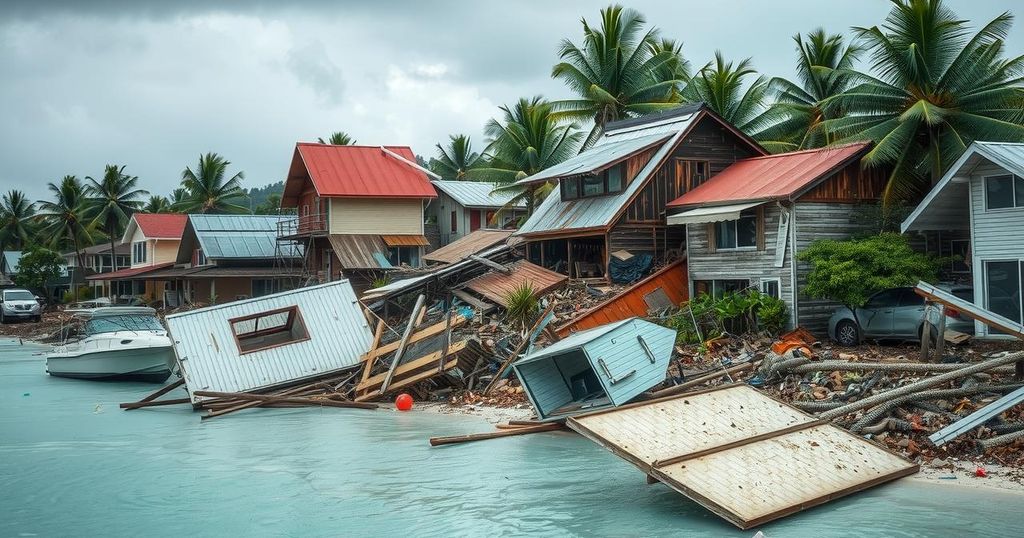Devastation in Mayotte: Tropical Cyclone Chido Leaves Hundreds Feared Dead

Tropical Cyclone Chido has devastated Mayotte, resulting in hundreds feared dead and significant infrastructural damage. The storm, classified similarly to a Category 4 hurricane, has left the region struggling to recover due to the destruction of hospitals and essential services. Government officials report that the death toll may rise dramatically, highlighting the dire need for immediate aid and long-term disaster preparedness in this impoverished territory.
Tropical Cyclone Chido has wreaked havoc in the French territory of Mayotte, leaving hundreds of residents feared dead following its devastating landfall over the weekend. Classified akin to a Category 4 hurricane, Chido exhibited unprecedented intensity with sustained winds surpassing 155 mph. Current reports suggest an official death toll of 20; however, François-Xavier Bieuville, the Mayotte Prefect, estimates the actual death toll could approach a staggering 1,000.
The cyclone’s catastrophic impact was exacerbated by the region’s environmental conditions, including unusually warm ocean waters that fueled its power. The densely populated and impoverished areas were hit hardest, making rescue and recovery efforts exceedingly difficult. Essential infrastructure, such as the local hospital and airport, has sustained significant damage, complicating aid delivery to the affected populace. In the immediate aftermath, French officials have reported extensive destruction, particularly in shantytowns where many of the undocumented migrants reside.
As rescue teams begin to assess the extent of the damage, reports detail scenes of total devastation, with homes stripped of roofs and entire neighborhoods rendered uninhabitable. The urgency of the situation has prompted French Interior Minister Bruno Retailleau to describe the events as “dramatic” and “absolutely exceptional.” Humanitarian efforts are now underway, albeit hampered by the damage and lack of basic necessities such as electricity, clean water, and food.
Mayotte has been a frequent target for cyclones, largely due to its geographical position in the Indian Ocean. Cyclone Chido not only underscored the island’s vulnerability but also highlighted the implications of climate change on weather patterns, as noted by experts who emphasize the increasing strength of tropical cyclones in the region. With the cyclone season ongoing, the need for effective preparedness and response mechanisms has never been more evident.
Cyclone Chido’s emergence as a formidable storm has been attributed to a combination of environmental factors, including abnormally warm sea temperatures. The geographical context of Mayotte—a territory that serves as a migration hub for people from economically disadvantaged regions of Africa—complicates the challenges faced during disaster recovery. The dense population living in poverty-stricken and undocumented conditions heightens their susceptibility to tropical cyclones, emphasizing the necessity for immediate and comprehensive humanitarian aid. Additionally, the cultural practice of rapid burial in Islamic tradition may further obscure the actual death toll, as individuals may not be formally accounted for in health statistics due to immediate interment after passing. This cyclone season serves as a stark reminder of the need for robust disaster response strategies in vulnerable regions affected by climate change.
In summary, Tropical Cyclone Chido has inflicted catastrophic damage upon Mayotte, raising fears of a significant loss of life amid severe infrastructural destruction. The cyclone’s power was attributed to warming ocean waters and a lack of sufficient protective measures for the vulnerable population. As rescue and recovery efforts are initiated, the situational urgency is underscored by government officials, signaling the critical need for immediate assistance and longer-term strategies for climate resilience in the region. The devastating effects of this storm are a clarion call for improved disaster preparedness in light of increasing cyclone intensity linked to climate change.
Original Source: www.spokesman.com






